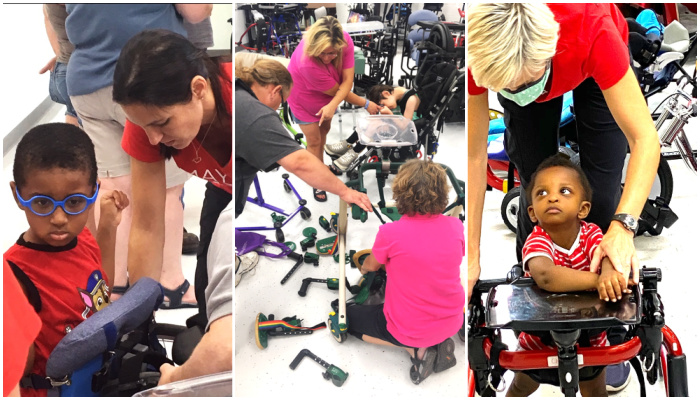I’m Planning for a 70-Year retirement… How About You?

I must confess: I love reading personal finance websites. Which isn’t that unusual as I’ve always been keenly interested in personal finance, so much so that I even worked in corporate finance for four years.
In the end, though, I decided that I preferred finance as my personal hobby rather than a career, but there comes a point where reading personal finance websites and blogs is just too frustrating.
See, as much as I’d like to represent the two-incomes, two-child norm in the United States—I just don’t. I’d like to retire comfortably for 20 years, but instead I have to plan a retirement for 70 years. No, I didn’t find the fountain of youth to keep myself alive until I’m 140. It’s just my reality. Maybe it’s your reality too?
Because 9 years ago… Alexis was born, a constellation of multiple genetic differences, amounting to developmental delays, hearing impairment, low vision, non-ambulatory and not eating all calories by mouth. Believe me, I was glad to be insured and glad that medically most of her mysteries have been solvable. But her financial needs require that I plan for a 70 year retirement… or more! Ekk!

My husband and I both work full-time jobs to afford for our current lifestyle PLUS to save our excess income to provide for Alexis’ needs after we are gone. There are ways to do this through life insurance, including individual and last-to-die policies. There are also new accounts like ABLE accounts (which allow parents to put aside money tax-deferred, to be used for education, housing, transportation, therapy, rehabilitation and assistive technology for their special needs children) that just became available through legislation earlier this year. But whether it’s through insurance or ABLE accounts, it still takes funds. There is no such thing as a free lunch.
Now, we are lucky because we do get some extras through our secondary health insurance, called MassHealth (the Massachusetts version of expanded Medicaid), which pays for hearing aids and even some of Alexis’ specialized medical equipment. Unfortunately though, like many families, our incomes just can’t cover current day-to-day living expenses AND saving for retirement AND saving for Alexis’ future AND providing for all of the extra expenses, which include (but certainly aren’t limited to) specialized child care, equipment, recreation activities, home and an accessible van.
Amongst the families I know, making sure their wheelchair accessible vehicle stays in top working order is serious work. Without it, their loved ones can’t go to school or the hospital—could you imagine if your only way to transport your child was by calling an ambulance? (That’s really expensive UBER). What if you had to choose between these basic abilities for your child: to talk, to eat, to bathe or to move? For us, Alexis requires specialized equipment for all of those things—what if we couldn’t find the financial resources to provide those for her!
Would it surprise you to know that raising a child with special needs can be nearly 10 times more expensive than raising a typical child? Huffington Post shared in 2014 that the average cost of raising a child is $245,340. A study published in JAMA Pediatrics identified expenses of $2.4M for kids diagnosed with Autism Spectrum Disorder (ASD).
Granted, Alexis does not have this particular diagnosis, but for this study researchers reviewed medical literature on the costs related to autism and noted that while most prior research had focused on individual areas, their study aimed to incorporate other factors, including societal costs, productivity, and indirect expenses.
Overall, the study found that supporting a U.S. resident with autism and an intellectual disability would cost about $2.4 million, largely due to costs associated with special education and lost productivity among parents. And even if your child isn’t diagnosed with ASD specifically, I’m sure you can relate to the criteria used in the study!

So, sometimes you might see me with a worried look on my face. Maybe I’m worried that one day, my employer will deem I’m expendable because I have special home conditions that prevent me from being 100% always there. Or maybe, I’m trying to strategize about which is more important: joy today or meeting Alexis’ needs when we are gone?
Maybe you’d like to help—and I’d say—yes, help! Just say something. Maybe it’s not financial, maybe it’s a hug. Maybe it’s a warm meal, maybe it’s just an ear to listen to me. Feel free to offer, I’ll accept any currency. Because I’m giving it all I got.
Catherine Rose has a PhD in Mechanical Engineering and an MBA and has worked in Supply Chain, Project Management, Corporate Finance and now as a Product Manager for Healthcare Lighting projects, including the amazing LightAide. But her most important job is mom to Alexis and Jessica. You can read more about Catherine on her blogs, Schnaderbeck Family and Dr Catherine Rose, or follow her on Twitter @drcatherinerose.

Related Posts

Assistive Technology, Support
May We Help: Engineering Independence for People with Disabilities
May We Help is dedicated to designing and building custom solutions that help individuals of all ages achieve mobility, access, and independence, all at no cost.

Special Needs, Support
Five Steps to Finding Joy: Faith and the Journey of Parenting with Special Needs
Through faith special needs parents can learn to cultivate a deep, enduring state of joy.

Special Needs, Support
How Do You Keep Faith Alive When Your Child Remains Ill?
I understand the emotional toll of chronic illness, but I also believe in the power of faith and community to uplift and sustain us.